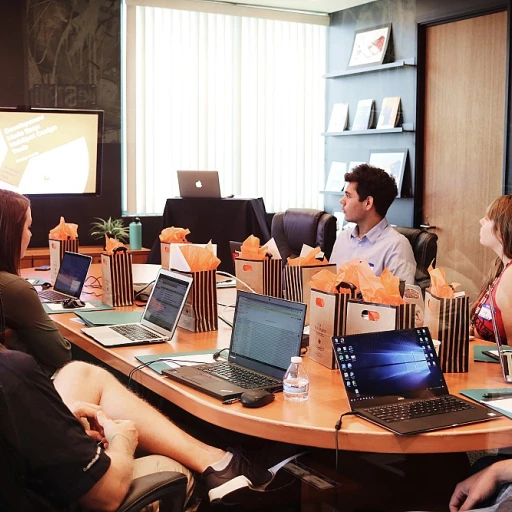
Unveiling the Fabric of Corporate Culture
Unraveling the Essence of Workplace Culture
Corporate culture, often envisioned as the heart of an organization, is the tapestry woven from the values, beliefs, and behaviors that form the unique social and psychological environment of a business. An Office Manager plays a crucial role in not only maintaining but actively cultivating this intricate fabric. It involves a deep understanding of the organization’s core principles and the implementation of policies that resonate with them. Consider, for example, how Google has fostered an innovative culture by encouraging risk-taking and creativity, which has become a benchmark in corporate culture dynamics.
Establishing Robust Communication Channels
Effective communication is the bedrock upon which a unified corporate culture stands. Office Managers are tasked with creating an environment where open and honest communication is not the exception but the norm. This includes not just vertical, but also horizontal, and diagonal communication streams throughout the organization. Zappos, acclaimed for its strong culture, attributes much of its success to transparent communication systems. By fostering effective dialogue, an Office Manager ensures that every employee, regardless of their position, feels heard and valued.
Empirical Insights into Culture Crafting Success
Every strategy to nurture corporate culture should be backed by solid statistics. Research shows that companies with strong cultures have a 4X revenue growth compared to those with weaker ones. Similarly, a Columbia University study found that the likelihood of job turnover at companies with high cultural cohesion is a mere 13.9%, as opposed to 48.4% in low culture cohesion companies. Office Managers can leverage such statistics to devise culture strategies that contribute to retention and performance.
Blending the Traditional with the Innovation-Driven Era
The challenge for modern Office Managers is the delicate balance between preserving time-honored traditions that define an organization and embracing innovative practices that drive the future. This could mean incorporating cutting-edge technology into the daily workflow while still celebrating the legacy milestones that have shaped the company's journey. Apple Inc. is a prime example of a company that has achieved this balance, constantly disrupting the market with innovation while maintaining a culture steeped in its founding ideals.
Promoting Healthy Discourse and Feedback
Finally, establishing platforms for open debate and feedback is crucial for a thriving corporate culture. Office Managers should promote an atmosphere where constructive criticism is not only accepted but encouraged. Providing employees with the agency to voice concerns and suggestions can lead to actionable insights that enhance the workplace. For instance, Salesforce has seen immense success with their 'V2MOM' process, which allows employees at all levels to share their visions and concerns, thus contributing to a collective corporate culture.
Communication as the Cornerstone of Connectivity
Deciphering the Mystique of Organizational Ethos
The corporate culture of an organization is akin to the lifeblood that permeates every aspect of its being, influencing decisions, driving strategies, and shaping interactions both within and beyond the company's walls. An adept Office Manager recognizes that at the heart of every thriving business is a robust and vibrant culture, often seen as a complex tapestry woven from values, beliefs, and behaviors that collectively define the company's identity. Appreciating the intricate nature of this fabric is essential for any Office Manager seeking to nurture a nurturing environment.
Office Managers as Cultural Custodians
Viewed as the stewards of workplace atmosphere, Office Managers hold a pivotal role in fostering and perpetuating the company's core values. Their daily interactions and managerial practices contribute significantly to the work environment, playing a crucial part in the manifestation of the company's cultural narrative. This encompasses everything from the regular cadence of team meetings, the subtleties of office layout, to the proficiency of business communication, and reverberates through employee satisfaction metrics and productivity levels.
Corporate Culture's Impact on Recruitment and Retention
Understanding the dynamics of corporate culture is not a mere exercise in philosophy; it has tangible impacts on both the attraction of new talent and the retention of existing staff. A study by Deloitte revealed that 94% of executives and 88% of employees believe a distinct workplace culture is important to business success. Office Managers must be acutely aware of these numbers as they are directly in the fray, shaping the experiences that make employees choose to stay or part ways with the organization.
By instilling a sense of community and continuity within the corporate culture, Office Managers ensure that the company remains grounded in its foundational values while still aspiring to innovate and grow. This delicate balance is the secret ingredient for a thriving and resilient corporate ecosystem.
Embodying the Brand Through Employee Engagement
Employees often look to their leadership for cues on how to act and engage with others within the company. An Office Manager's ability to lead by example—honoring the company's mission while encouraging individual contributions—is vital in cultivating a unified culture. This is not just about creating company policy; it's about embodying it. For employees to truly live the brand, they need to see it in action. Doing so establishes a standard that can transform abstract concepts into the fabric of daily work life, thus enhancing cohesion across all levels of operation.
In conclusion, the corporate culture is far more than just a concept; it's the operational essence of a company. Office Managers who understand and leverage this can weave a fabric that not only unifies the workforce but also supports the overarching goals of the company. Cultivating such an environment is not without its challenges, but the rewards of a cohesive and dynamic corporate culture are immeasurable.
The Statistics Behind Successful Culture Strategies
Building Bridges Through Effective Dialogue
In the bustling environment of office management, fluent and clear communication acts as the cornerstone of corporate connectivity. As an office management analyst, I can assert that consistent and open channels of dialogue are pivotal in fostering a culture that not only thrives on collective goals but also values individual input. According to a recent study from the Queen's University of Charlotte, a staggering 75% of employers rate teamwork and collaboration as 'very important', yet only 18% of employees get communication evaluations at their performance reviews.
- Ensuring regular team meetings
- Implementing feedback loops
- Leveraging digital communication tools
are all strategic methods office managers can employ to reinforce this vital aspect of office culture.
"The art of communication is the language of leadership," - James Humes. Indeed, for office managers, adept communication skills transcend transactional exchanges and become a tool for crafting a vibrant, cooperative workspace.
Engaging Through Transparent Communication Practices
It's important to acknowledge that in today's data-driven era, office managers need to integrate an analytical approach to communication. Collecting feedback through surveys or suggestion boxes provides valuable insights that could lead to palpable improvements in the corporate atmosphere. Recent surveys have indicated that companies with effective communication practices enjoy 47% higher returns to shareholders, salespeople see 50% higher customer loyalty, and a 20% higher market premium is not uncommon (Watson Wyatt).
By creating an environment that nurtures transparency and trust through communication, an office manager not only sets the tone for a unified corporate culture but also lays the groundwork for enhanced productivity and employee satisfaction.
Facilitating Collaboration with Technology
In the digital age, office managers must leverage technology to facilitate seamless communication. Integrating platforms such as Slack, Trello, or Asana can revolutionize how teams interact, enabling real-time collaboration irrespective of geographic boundaries. According to a McKinsey report, social technologies have the potential to raise productivity levels by 20-25% among knowledge workers. By focusing on specific technologies that align with the company's culture and working style, office managers can ensure that the integration of communication tools is both strategic and effective.
Furthermore, incorporating video conferencing tools like Zoom or Microsoft Teams, especially in light of increasing remote work trends, is a specific example of how cultural connectivity can be maintained even when face-to-face interaction is not possible.
Integrating Tradition with Modernity in Corporate Culture
Decoding Culture with Data: The Role of Metrics in Culture Optimization
The effective realignment of corporate culture is a deliberate process backed by solid data. Statistics play an essential role in the continuous diagnosis and development of a company's culture. According to a recent study by Deloitte, 88% of employees believe a distinct workplace culture is an integral part of business success. Moreover, organizations with strong cultures have seen a 4x increase in revenue growth. These figures illustrate that culture is not just a HR buzzword but a quantifiable driver of performance.
Implementing data-driven strategies allows Office Managers to monitor engagement levels, employee satisfaction, and leadership effectiveness, which are all critical indexes for a thriving corporate culture. For instance, regular employee surveys can yield actionable insights into the current cultural climate, while also providing a platform for staff to voice concerns and suggestions.
Fostering High-Performing Teams Through Cultural Metrics
- Employee Retention Rates: Companies with a strong culture have a 30% higher level of retention, per Bain & Company.
- Productivity Metrics: Gallup reports that highly engaged teams show 21% greater profitability.
- Employee Net Promoter Score (eNPS): indicates employees' willingness to recommend their workplace to others, which correlates with overall employee morale and satisfaction.
By focusing on such metrics, Office Managers can correlate the intangible aspects of culture with tangible outcomes, thereby translating cultural initiatives into measurable results.
Mapping the DNA of Decision-Making: Culture Influences Outcomes
What truly underscores the importance of culture is its impact on decision-making throughout the organization. A Harvard Business Review article highlights that companies with a strong culture can achieve up to a 60% improvement in decision-making processes. This is because a well-defined culture provides a common language and a set of norms that guide individuals towards making decisions aligned with the company's goals.
Culture is not just built during team-building activities or off-site retreats, but it's also woven into the daily tapestry of workplace interactions and decisions. This binds teams together, not just in moments of consensus, but particularly through times of conflict and challenge, ultimately influencing the company's trajectory towards growth and innovation.
While the impact of culture on the bottom line is sometimes considered immeasurable, Office Managers who adopt a strategic approach to cultural development, backed by robust statistics, will not just cultivate cohesion but will empower their organizations to thrive in today's competitive business landscape.
Encouraging Debate: Open Forums and Feedback Mechanisms
Merging Heritage and Innovation for a Robust Company Identity
The essence of a robust corporate culture often hinges on the delicate balance between venerating tradition and embracing innovation. A study by Deloitte highlighted that 94% of executives and 88% of employees believe a distinct workplace culture is important to business success. Office managers are pivotal in harmonizing these dual aspects to foster a unified culture. By spotlighting established rituals and pairing them with cutting-edge practices, they map a course for enduring relevance and team unity.
Fostering Inclusivity with Traditional and Modern Values
An office manager's strategy should be to integrate time-honored company values with modern ideals. For instance, commitment to excellence, a classic corporate valu, gains fresh impetus when aligned with contemporary approaches like agile methodologies or continuous improvement programs. A survey from McKinsey & Company suggests companies that excel at both agility and stability are 70% more likely to be ranked in the top quartile of organizational health, the best indicator of long-term performance.
Creative Synergy: Blending the Old and the New
Creativity in blending various cultural facets can set a company apart. Office managers can initiate themed team-building events that reflect the organization’s heritage while leveraging technology, such as virtual reality simulations or collaborative online platforms, to enhance participation and engagement. Forbes notes that businesses that invest in team building are often more successful at retaining employees, with enhanced team productivity and morale as tangible benefits.
- Spotlighting company milestones through digital storytelling
- Reviving traditional celebrations with modern twists, such as virtual meetups or social media challenges
- Invoking the organization's past successes as case studies in training modules, linking historical foundations with present-day scenarios
Embarking on a journey that respects and revitalizes corporate traditions while incorporating modern methodologies and technologies can yield an inclusive, dynamic, and cohesive corporate culture, key to sustainable success and employee satisfaction.





